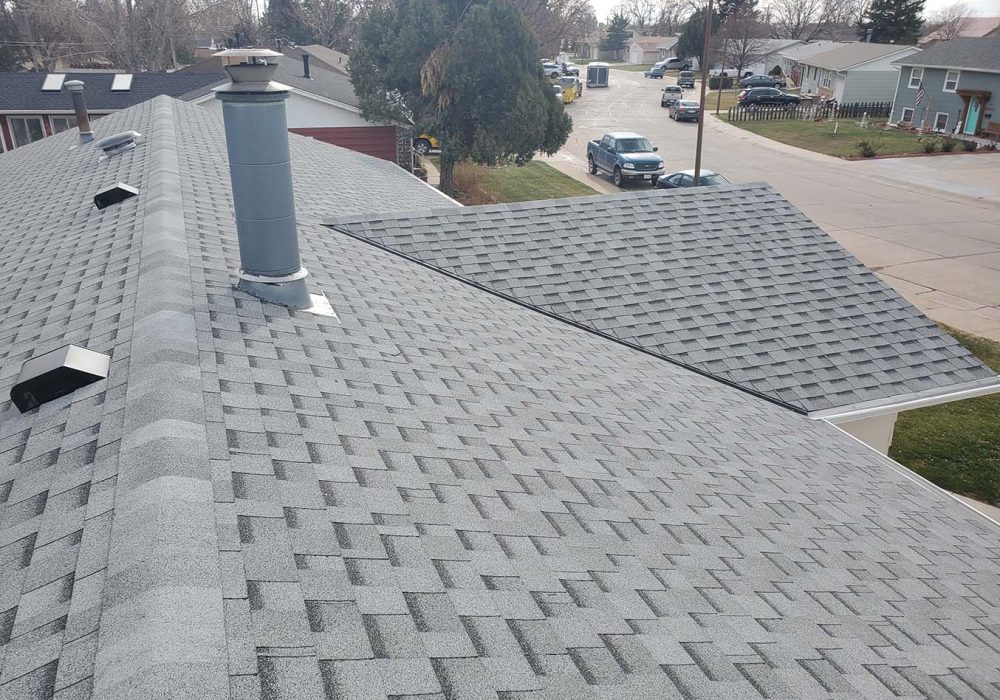
- Custom Exteriors
- April 4, 2023
Do I need a class 4 shingle for my roof replacement?
When you need to replace your roof, the topic of replacement materials is high on the list of considerations. In narrowing down roofing materials, the question of whether or not to invest in Class 4 (Impact Resistant) shingles often arises. This choice is not just about appearances and costs but also protection, durability, and long-term investment in your property. As a roofing contractor based in Colorado, our area is prone to hailstorms, and many homeowners choose to use Class 4 replacement shingles. In our area, some jurisdictions require a Class 4 replacement due to our tendency towards severe weather. In this article, we’ll talk about the significance of Class 4 shingles and whether they are necessary for your roof replacement.
The decision to choose Class 4 shingles should be an informed decision based on your location, the typical weather patterns in your area, the design of your roof, and the long-term implications of your roofing material choice. By the end of this article, we hope you have a clear understanding of Class 4 shingles so that you can make an informed decision tailored to the specific needs of your property. Whether you are building a new home, replacing an old roof, or just upgrading your current roof for better protection, let our experience give you the insights you need to make the right choice!
What is a Class 4 Shingle?
Class 4 shingles are the highest-rated shingles available on the market when it comes to impact resistance. These shingles are designed to withstand hailstorms and extreme weather conditions. They are also tested and certified to meet specific industry standards for impact resistance. You can get a Class 4 in many materials, including asphalt shingles and metal roofing products.
Class 4 shingles come in a variety of colors and styles to suit different architectural designs. They are commonly used in regions that experience high winds, hailstorms, and severe weather conditions.
How is a Class 4 Shingle Rated?
The impact resistance of a Class 4 shingle is determined by performing a test that simulates hailstones hitting the roof at high speeds. The test evaluates the shingles’ ability to resist damage from impacts of different sizes and strengths. Shingles that meet the test requirements are rated as Class 4 and are considered the most durable and impact-resistant shingles available.
Class 4 shingles undergo rigorous testing to ensure they can withstand impact from a 2-inch steel ball dropped from a height of 20 feet without cracking or showing any signs of damage. This testing is conducted by organizations such as Underwriters Laboratories and the International Code Counsel. The Class 4 designation comes from the American Society for Testing and Materials (ASTM) D3462 standard, which measures the durability and impact resistance of roofing materials.
The Differences of Class 4 Shingles
Impact Resistance: Class 4 shingles have a higher impact resistance than Class 3 shingles. So, they can withstand impacts from larger hailstones. Also, they are less likely to be damaged by falling debris, such as tree branches. Class 4 shingles typically have a larger hailstone impact rating. This means they can resist impacts from 2-in-diameter hailstones at a higher speed than Class 3 shingles.
Durability: Class 4 shingles are made of thicker and more robust materials than Class 3 shingles. This makes them more durable and able to withstand extreme weather conditions. Class 4 shingles often have a longer lifespan than Class 3 shingles. This is because they are less likely to crack, break, or warp over time.
Cost: Class 4 shingles are typically more expensive than Class 3 shingles. This is because they are made of higher-quality materials designed to provide better protection against impact damage.
Added Benefits of Class 4 shingles
Insurance Discounts: Homeowners may be eligible for insurance discounts if they install Class 4 shingles on their roofs. This is because Class 4 shingles are less likely to sustain damage during severe weather events. Because of this, there is a reduced likelihood of insurance claims. Insurance companies may offer lower premiums for homes with Class 4 shingles installed.
Ultimately, installing Class 3 or Class 4 shingles will depend on the homeowner’s specific needs, budget, and preferences. It may be a wise investment if you live in areas like Colorado or Wyoming, which are prone to hailstorms. A qualified roofing contractor can help you decide if a Class 4 shingle fits you well.
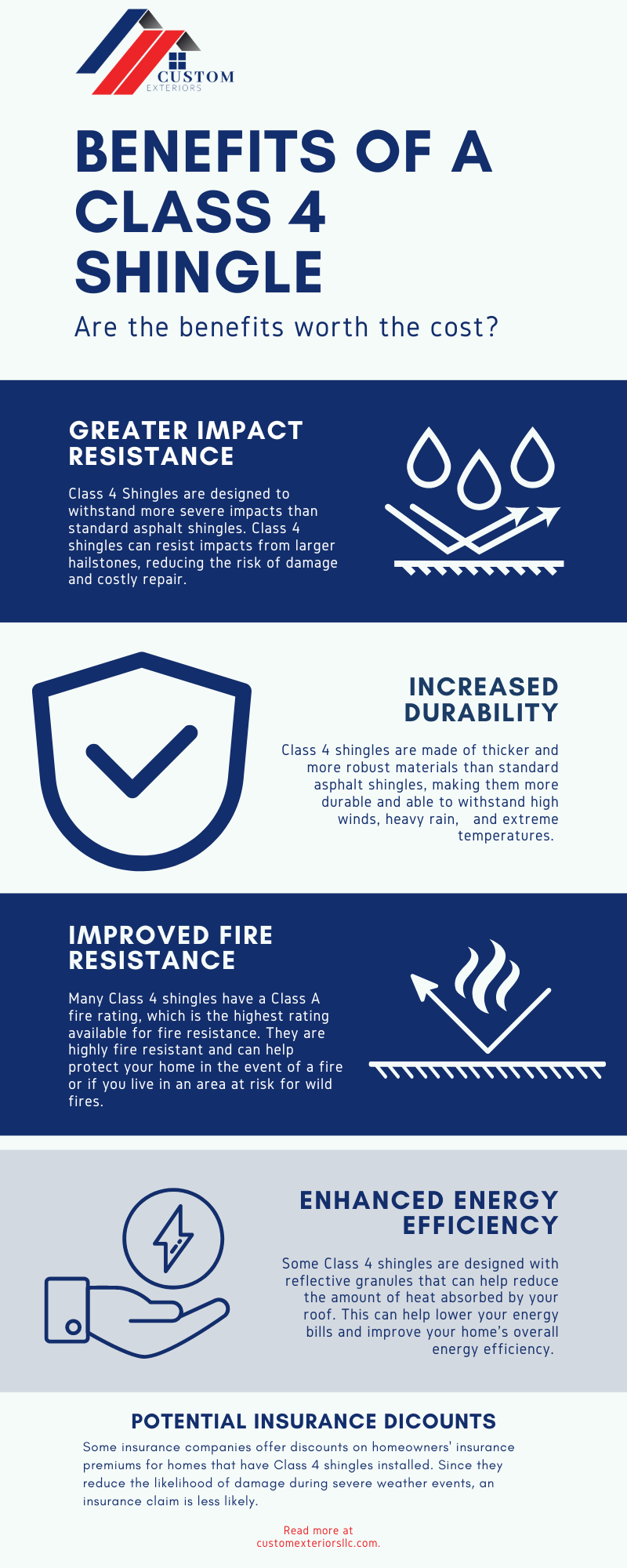
The Impact Classes of Shingles
Shingles are rated in classes one through four. The decision to choose a Class 4 shingle is based largely on your local weather conditions. Each of the shingle classes is rated to withstand the following impacts:
- Class 1 shingles can withstand impacts from 1.25-inch diameter hailstone at a speed of 50 mph.
- Class 2 shingles can withstand impacts from 1.50-inch diameter hailstone at a speed of 50 mph.
- Class 3 shingles can withstand impacts from 1.75-inch diameter hailstone at a speed of 50 mph.
- Class 4 shingles can withstand impacts from 2.0-inch diameter hailstone at a speed of 70 mph.
It is important to note that the impact resistance of asphalt shingles is just one factor to consider when choosing a roofing material. Homeowners should also consider other factors, such as the style of their roof and home, fire resistance, durability, and resistance to other weather-related damage when selecting a roofing material. Your local, trusted roofing contractor can assist in determining your specific needs.
When Does a class 4 shingle make sense?
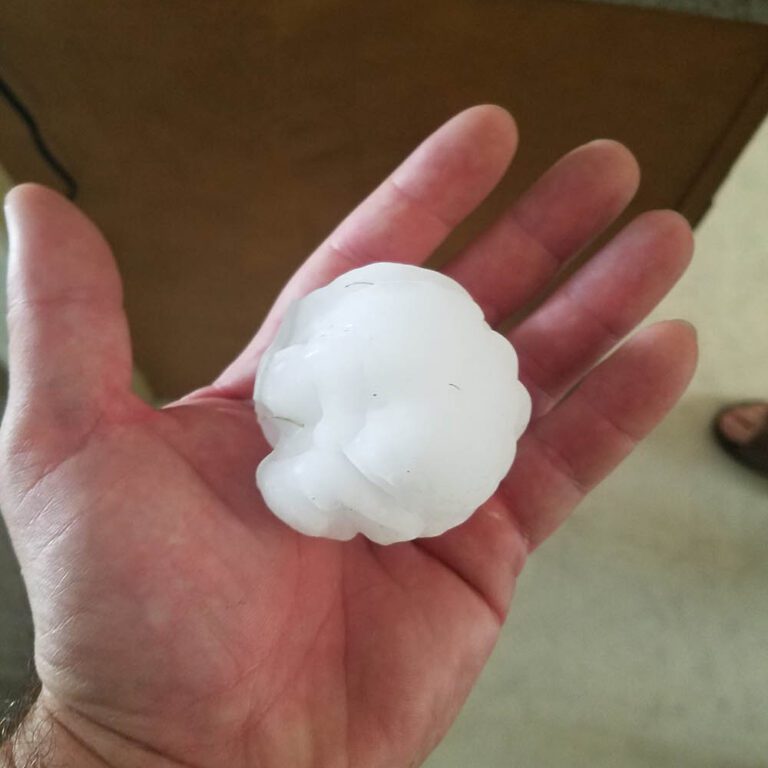
Class 4 shingles, also known as impact-resistant shingles, are designed to withstand severe weather conditions. They easily protect your roof from hail, high winds, and other potential damage. Here are some circumstances in which it may make sense to consider getting Class 4 shingles:
Hail-Prone Areas: If you live in an area that experiences frequent hailstorms, Class 4 shingles can provide enhanced protection against hail damage. These shingles are specifically tested to withstand hail impacts, reducing the likelihood of roof leaks and costly repairs.
High-Wind Areas: If your region is prone to strong winds, such as hurricane-prone coastal areas or tornado-prone regions, Class 4 shingles can offer added resistance. These shingles are designed to withstand high winds and can provide greater security for your roof during severe storms.
Insurance Requirements: In some cases, insurance companies may offer discounts on homeowners’ insurance premiums for properties with Class 4 shingles. If your insurance provider offers such incentives, it can be financially beneficial to install these shingles, as they can potentially reduce your insurance costs over time.
Long-Term Investment: If you plan to stay in your home for an extended period, investing in Class 4 shingles can be a wise decision. These shingles are generally more durable and longer-lasting than standard shingles, which means they may require fewer repairs or replacements over time, saving you money in the long run.
Personal Preference: Even if you don’t live in an area prone to severe weather, you may opt for Class 4 shingles simply because you value the added protection and peace of mind they offer. If you have the budget and prioritize the longevity and durability of your roof, Class 4 shingles can be a good choice.
It’s important to note that the decision to install Class 4 shingles should be based on various factors, including your specific location, climate, budget, and personal preferences. Consulting with a professional roofing contractor can help you determine the most suitable roofing material for your specific circumstances.
Maintaining your roof for a long lifespan
If you have decided that Class 4 shingles are a good fit for your home or business, roof maintenance is key to keeping them in good shape and extending the life of your investment. While Class 4 shingles are designed to be durable, regular maintenance is important to ensure years of performance.
Maintenance of Class 4 Shingles
- Conduct bi-annual inspections of your roof, ideally during spring and fall, to address damages early.
- Any damage discovered during inspections should be repaired promptly to prevent water leaks or further damage.
- Ensure gutters and downspouts are clean and clear of blockages to prevent possible water damage.
- Verify proper attic ventilation function to extend the life of your roof.
Investing in a Class 4 shingle for your home or business isn’t just about the immediate benefits in terms of impact resistance and durability. With proper maintenance and care, these shingles offer long-term protection and provide peace of mind knowing your home is protected. The combination of durable materials, proper installation, and conscientious maintenance practices ensures your investment in your home will continue to provide long-term returns.
Contact Us Today
We Service and Support the Following Brands




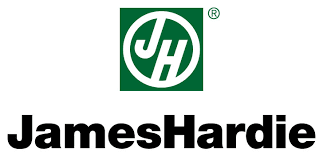

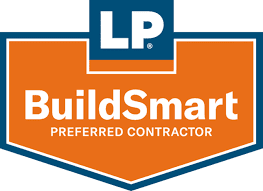
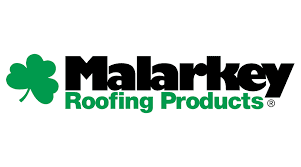


Contact
Custom Exteriors, LLC
18674 Co Rd 3, Berthoud, CO 80513
109 E. 17th St. Ste 5822, Cheyenne, WY 82001
102 S. Tejon St. Ste 1100, Colorado Springs, CO 80903
404 Broadway, Eagle CO 81631
Phone: 970-460-8714
Toll Free: 800-580-0131
Quick Links
© 2022 Custom Exteriors, LLC


